Won't You Be My Neighbor?
 for some thematic elements and language.
for some thematic elements and language.
Reviewed by: Jonathan Rodriguez
CONTRIBUTOR
| Moral Rating: | Average |
| Moviemaking Quality: |
|
| Primary Audience: | Adults Young-Adults |
| Genre: | Biography Documentary |
| Length: | 1 hr. 34 min. |
| Year of Release: | 2018 |
| USA Release: |
January 19, 2018 (festival) June 8, 2018 (29 theaters—limited) September 4, 2018 (DVD) |
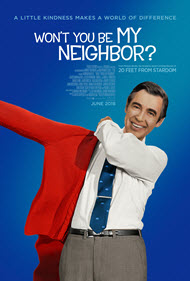

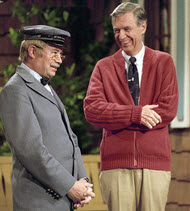
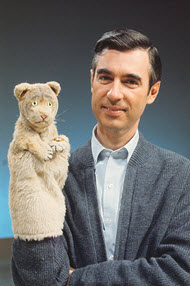
For a follower of Christ, what is LOVE—a feeling, an emotion, or an action? and what else is involved? Answer
The importance of kindness and gentleness
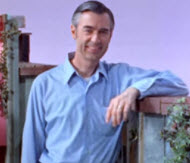
The importance of HUMILITY
What is goodness?
What is righteousness?
Being genuine and honest with children
It is NOT enough to teach good character traits to children; they must also learn about the innate sinfulness of people, the holy justice of God, and the only way to become a regenerate, child of God receiving eternal life with our Creator based on the redemption of the sinless Jesus Christ who died for our sins and rose again.
 Stumped about how to share your belief and faith in Christ with others? The Effective Evangelism portion of our site assists followers of Christ in effectively reaching out to others with love and truth. Learn about the worldview of the people you meet, ways to share the Gospel, read stories submitted by site users, and more.
Stumped about how to share your belief and faith in Christ with others? The Effective Evangelism portion of our site assists followers of Christ in effectively reaching out to others with love and truth. Learn about the worldview of the people you meet, ways to share the Gospel, read stories submitted by site users, and more.
What entertainment is good and nurturing for kids, and what is harmful?
How to be a good neighbor
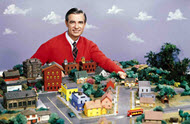
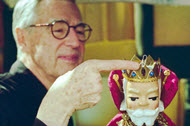
| Featuring |
|---|
|
Fred Rogers … Himself (archive footage) Joanne Byrd Rogers … Herself—Fred’s wife Betty Aberlin … Lady Aberlin (archive footage) François Scarborough Clemmons … Himself Robert F. Kennedy … Himself (archive footage) Koko … Herself (archive footage) Yo-Yo Ma … Himself Christa McAuliffe … Herself (archive footage) Joe Negri … Himself David Newell … Himself John O. Pastore … Himself (archive footage) Betty Seamans (Elizabeth Seamans) … Herself Tom Snyder … Himself (archive footage) Margaret Whitmer (Margy Whitmer) … Herself McColm Cephas Jr. … Kid Kailyn Davis … Kid |
| Director |
| Morgan Neville — “20 Feet from Stardom” (2013) |
| Producer |
|
Tremolo Productions David J. Cornfield Linda A. Cornfield See all » |
| Distributor |
If you grew up anytime between the late 1960’s through the early 2000’s, chances are high you are very familiar with the man at the center of the new documentary “Won’t You Be My Neighbor.” Spending each afternoon (or morning, depending on the time the show aired in your neighborhood) with Mister Rogers was practically a rite of passage for any American child who had access to a television. Ask anyone over the age of thirty how crayons are made, and I’d bet a good three-quarters of them would recall the crayon factory episode with great fondness. But, how well did we know the man who invited us into his make-believe home every day?
Here’s the thing—the whole point of a documentary is to inform, and so rehashing in this review all the details we learn of Fred Rogers’ life from the movie would sort of defeat the purpose of watching and learning them for yourself. I went in knowing very little about him, other than the fact that he was an ordained Presbyterian minister. And, as a kid who grew up in the middle years of his program’s run, I was less familiar with some of the groundbreaking moments from the earlier years of the show—the episodes following the Bobby Kennedy assassination, for starters. But the movie first takes us a little further back, showing how Fred Rogers got his start in television—the forces that drew him toward the camera and away from the pulpit.
We hear from various people from Fred’s life—those who helped shaped him into the man he was and those who he influenced in profound ways, although these are not mutually exclusive. We see how episodes of “Mister Rogers’ Neighborhood” so directly dealt with social issues of the time (and our current time, in some instances). We learn about what inspired his passion for reaching children and showing them their worth. We learn the role his faith in God played in his life, and the influence that faith had on others. We witness the struggles he had in dealing with a world where something like 9/11 could happen. And, we hear some of the final things he said, thoughts he had, as his life drew to a close.
“Won’t You Be My Neighbor” is rated PG-13 for “some thematic elements and language.” I must admit I was surprised when I first learned the film had received that rating. I even double-checked certain Web sites to make sure I hadn’t misread it. How could a movie about a man who had a PBS program for young children receive a rating that makes the movie less accessible for younger children? To be honest, this movie isn’t really for kids though. Unless the children of today have been made to watch “Mister Rogers’ Neighborhood” by parents who grew up on the show, kids aren’t going to have the same interest in or connection with the man at the center of the story. This movie is primarily for those of us who will remember the words to the songs the second we begin to hear them again, who will welcome a trip back to a “Neighborhood of Make-Believe” we moved away from many years ago.
As the rating description suggests, the film does contain some language, although most of it is relatively minor and comes at various points from just one colorful member of the Mister Rogers’ stage crew. We do also get to see Eddie Murphy’s SNL spoof of the “Won’t You Be My Neighbor” song, in which he rhymes a word with “rich.” The “thematic elements” in the movie mostly revolve around the things happening in the world that found their way onto the show. The movie discusses race relations by showing that infamous footage of a man pouring chemicals into a pool occupied by African Americans. As mentioned before, the Bobby Kennedy assassination is addressed, and we see footage from the shooting, including the bloody top of his head. 9/11 is addressed, and some footage is seen from that as well.
A man’s bare backside is seen in a photo, and the scene is played for laughs. Basically, a crew member plays a prank on Mister Rogers, but we see a more playful side of our childhood friend as he gets the upper hand and beats the prankster at his own game. A woman is briefly seen in lingerie during a Johnny Carson sketch spoofing Mister Rogers. A former cast member who came out as homosexual talks about how that news reached Fred, and how he responded. And, the topic of Mister Rogers’ sexuality is briefly brought up as well, during old interview footage and comments from those who knew him. The homosexual former cast member tells us that if Mister Rogers wasn’t a straight man, he sure had him fooled.
As always, discernment is advised when viewing movies for yourself or taking children to go see them. The content may steer some parents away from letting their children watch this movie, but, honestly, I’m not all that sure the movie will resonate with them anyway.
One of the most interesting things I have heard lately as people talk about “Won’t You Be My Neighbor” and the impact Fred Rogers had on them is how, while many of them are not people of faith, they recognize and appreciate how Fred’s faith was lived out so obviously in his everyday life. The movie came up in discussion with my boss recently, and he (a man who instead of a “Jesus Fish” on his car has a “Flying Spaghetti Monster”) brought up how Mister Rogers was the kind of Christian he wished all Christians would be. I have heard this and/or read this in reviews of the movie as well.
As Christians, we are supposed to be known and recognized by the love we have for one another. We are called to love our neighbor as ourselves, no matter what form our neighbor might take. We are called to love unconditionally, the way Christ first loved us. It saddens me to hear so many self-proclaimed Christians speak in ways not remotely loving, not remotely Christ-like. They are often the loudest voices society hears, and those are the voices society rejects and rebels against. Living our faith boldly and loving others unconditionally should also not be mutually exclusive, and examples like Fred Rogers should be everywhere non-believers turn.
For a follower of Christ, what is LOVE—a feeling, an emotion, or an action? and what else is involved? Answer
Much like the documentary of Ruth Bader Ginsberg that released earlier this year, “Won’t You Be My Neighbor” is very informative, highly entertaining, and surprisingly moving. But, also just like “RBG,” the movie doesn’t dig too deeply into anything that could be deemed negative. The films were both clearly made by people who admired their subjects and had little interest in digging for dirt, although we imagine (and hope) there is probably little dirt to be found on someone like Mister Rogers. But, “Won’t You Be My Neighbor” does give us brief glimpses of a side of Fred Rogers that might have made for a more fascinating film.
Don’t get me wrong, I really enjoyed this movie. I laughed a lot, smiled even more, and teared up on more than one occasion. Mister Rogers was a special man who had a remarkable impact on more people than he probably could have ever imagined and was a man who probably couldn’t exist into today’s TV culture. He told scores of people around the world that they were made special, that they had value and were worthy of being liked just as they are. But, as the movie and its subject subtly hint, the person who may have needed convincing most of this message was Fred himself.
- Nudity: Moderate
- Vulgar/Crude language: Moderate and NONE said by Mr. Rogers—“f-gs,” “d*ck,” “b*tch,” “b*stard,” “a**” (3)
- Sex: Moderate—sexual comments and topics only
- Profane language: Minor—“G*d no,” “Oh G*d,” “d*mn”
- Violence: Minor
- Occult: None
See list of Relevant Issues—questions-and-answers.


Moral rating: Better than Average / Moviemaking quality: 4½
PLEASE share your observations and insights to be posted here.


My Ratings: Moral rating: Excellent! / Moviemaking quality: 4½